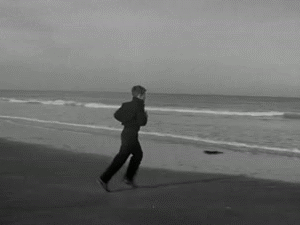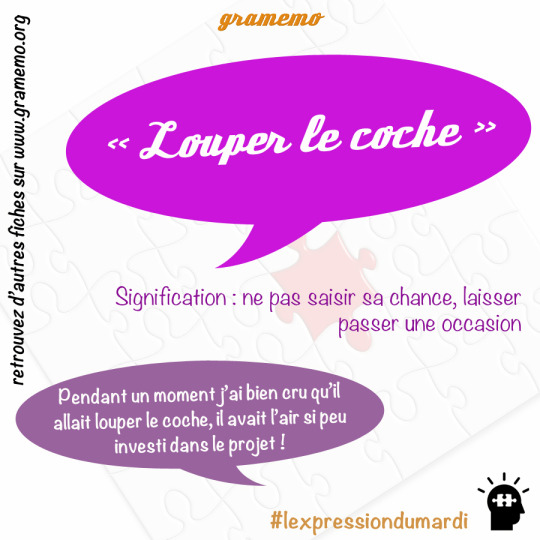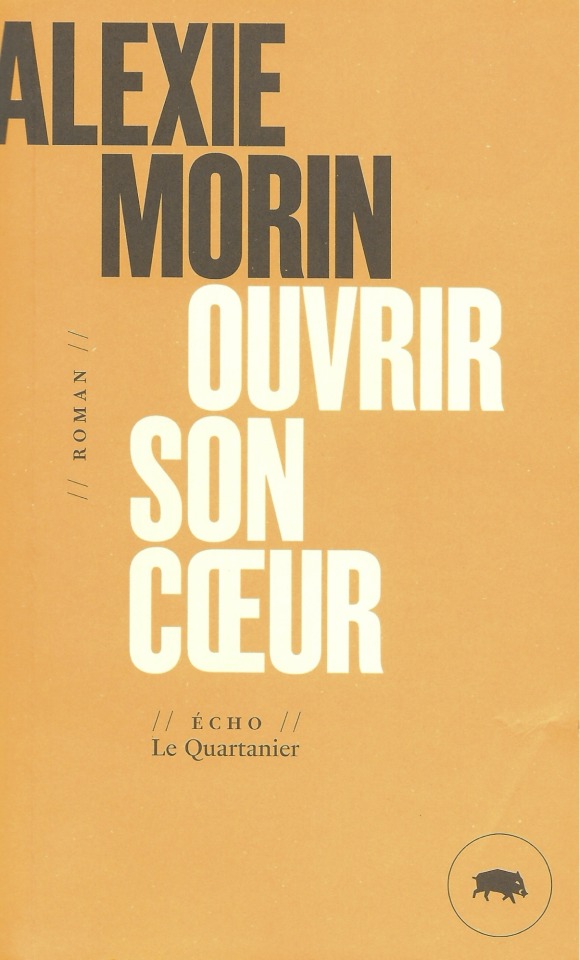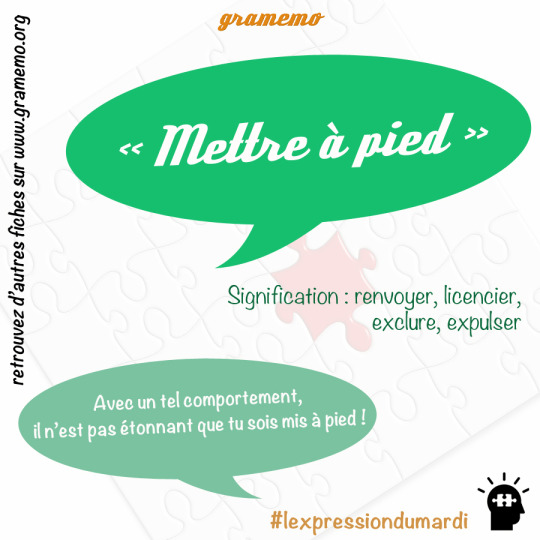#vocabulaire
Text
Les verbes les plus utilisés
Les auxiliaires
Être - to be (je suis une femme, il est avocat, elles sont plus grande que leur soeur, tu es d'accord avec eux)
Avoir - to have (j'ai trente ans depuis septembre, nous avons deux chiens et un chat, on avait du retard ce matin)
Les verbes communs
Aller - to be about to (je vais manger - I'm about to go eat); to go: à + city or article-free country, au + masc. country/location, à la + fem. location, aux + plural country, en + fem. country or means of transportation (je vais à Paris, à Cuba, au Canada, au café, à la mer, aux Caraïbes, en France, en métro)
Attendre - to wait (j'attends son arrivée - I'm waiting for her arrival); + de: expect from (j'attends des efforts de ta part - I'm expecting you to make efforts)
Avoir l'air - to look/seem: ø + adjective (tu as l'air perdu - you look lost), de + infinitive verb (elle a l'air d'être sûre d'elle - she seems confident)
Chercher - to look for (je cherche le chat - I'm looking for the cat); after aller: to get (je vais chercher mon colis - I'm going to get my package); try to remember (je cherche mes mots - "I'm looking for my words")
Comprendre - to understand (tu as tout compris - you got it)
Connaître - to be aware of (je connais bien Montpellier - I know Montpellier well, est-ce que tu as connu les pogs? - were you around when pogs were popular?)
Croire - to believe: + à (real) + definite article + noun (je crois au destin - I believe in destiny); + en (trust) (je ne crois pas en Dieu - I don't believe in God)
Demander - to ask: + à, ask if: si, ask for: de (j'ai demandé à mon frère de lui demander si elle veut venir - I asked my brother to ask her if she wants to come)
Devenir - to become (tu es devenu un beau jeune homme - you became a handsome young man)
Devoir - to have to, to be supposed to; present must, conditional present should (je dois manger - I have to eat, je devrais manger - I should eat)
Dire - to say to: + à (je le dirai à maman - I will tell mum)
Donner - to give: ø + noun, à + person (je donne une pomme à maman - I give an apple to mum)
Ecouter - to listen (j'écoute la pluie - I'm listening to the rain)
Entendre - to hear (j'ai entendu des bruits - I heard some noises)
Essayer - to try: ø + noun (je vais essayer une crevette - I'll try a shrimp), de + infinitive verb (il essaie de conduire - he's driving to drive)
Être en train de - to be in the process of (je suis en train de manger - I'm eating)
Faire - to make something happen/have someone do something for you (je fais nettoyer la cuisine par mon frère - I have my brother clean the kitchen); to do/make: ø + noun, à + verb (je fais mon lit tous les matins - I make my bed every morning, il fait froid - it's cold, ils font à manger - they're making food)
Faillir - to come close from (j'ai failli tomber - I almost fell)
Falloir - to be necessary to (impersonal verb*): ø + verb (il faut partir maintenant - we need to leave now), que + det/noun or pronoun verb (il fallait que tu rentres avant 19h - you were supposed to come home before 7pm)
Finir - to finish, end: ø + noun, de + infinitive verb (je finis de manger - I'm finishing my meal); to end up: + par + infinitive verb (j'en ai marre d'attendre, je vais finir par partir - I'm tired of waiting, I'm going to end up leaving)
Laisser - to let something happen, willingly or not (j'ai laissé refroidir mon plat - I let my meal cool down/get cold); to leave (je vais te laisser - I'll leave you alone, laisse-moi tranquille - leave me alone)
Mettre - to put on (clothes, music), up, something somewhere, someone in a situation (je mets mon bonnet - I'm putting my hat on), take an amount of time (j'ai mis trois heures pour venir - it took me three hours to come)

Parler - to talk to: + à (je parle à maman - I'm talking to mum); to talk about: + de (je parle de l'école - I'm talking about school)
Partir - to go in order to (je suis partie chercher mon fils - I went to go get my son); to leave: à + specific destination/organized trip (je pars à Londres ce week-end), for + vague destination/trip, maybe forced (nous partons pour le Mexique en juin); exiting a location: de chez + person (je pars de chez moi maintenant - I'm leaving home now)
Passer - to pop by to do something (passe me chercher à la gare - come pick me up at the station, je vais passer voir ma tante - I'm going to go visit my aunt)
Pouvoir - to be able to (je peux être là dans dix minutes - I can be there in 10); be likely to/wish to
Prendre - to take: ø + noun, à + verb (je prends un biscuit - I'm taking a biscuit, il a pris à manger pour ce midi - he packed food for lunch)
Regarder - to watch/look, oserve (regarde ça - look at that)
Rendre - to give back (je te rendrai ta clé demain - I will give you your key back tomorrow); to change state (ça l'a rendu fou - it made him crazy)
Rester - to remain (je reste calme - I'm keeping my cool); + chez + person or + à + definite article + location: to stay (je reste chez ma cousine jusqu'à lundi - I'll stay at my cousin's until monday)
Savoir - to know about/how to: que + det/noun or pronoun + verb (ils savent que tu es là - they know that you are here, je sais jouer de la guitare - I can play guitar)
Sortir - to exit (sors de ma chambre - get out of my room); + de: to just have finished something (je sors de table - I just finished my meal)
Tenir - to take/hold (tiens-moi ça - hold this for me); to hold dear (je tiens à toi - I care about you); to hold oneself/resist (tiens-toi droit - stand straight)
Tomber - to fall (over, down, out)/become (je suis tombée malade - I got sick); + sur: come across (je suis tombé sur ta mère - I ran into your mother)
Trouver - to find, come across, get (something you've been looking for), come up with, have the opinion that (je trouve sa robe jolie - I find her dress pretty)
Venir - to come in order to: + pour + infinitive verb (je suis venu pour aider - I came to help); + de: just did something (je viens de rentrer - I just got home) or from (je viens de Paris - I'm from Paris)
Voir - to see: que + det/noun or pronoun + verb (je vois que tu es déjà levé - I see that you're already up), à + appearence + that det/noun or pronoun + verb (il a vu à ton expression que ça n'allait pas - from your expression he could tell something was wrong)
Vouloir - to want to: ø + infinitive verb (je veux m'en aller - I want to go), partitive + noun (je veux du calme - I want some peace and quiet), que + det/noun or pronoun + verb (je veux que tu t'en ailles - I want you to leave)

Les verbes pronominaux
S'appeler - to be called (je m'appelle Rose - my name is Rose)
S'attendre à - to expect (tu t'attends au pire - you expect the worst)
Se demander - to wonder (ils se demandent où on va - they're wondering where we're going)
Se dépêcher - to hurry (dépêche-toi ! - hurry up!)
Se douter - to be suspicious of (je me doutais que tu serais en retard - I was pretty certain that you would be late)
S'excuser (de) - to apologize (je m'excuse de mon retard - I'm sorry for being late)
Se faire - to have something being done to you; passive form of faire + infinitive (je me suis fait virer par mon chef - I got fired by my boss)
Se lever/se coucher - to get up/go to bed (il se lève à 7h - he gets up at 7)
Se mettre - to start to (mets-toi en pyjama - start putting your pyjamas on)
Se mettre à - to start doing something (je me mets à manger - I'm starting to eat)
Se passer - to happen (qu'est-ce qu'il se passe ? - what's happening?)
Se rendre - to go somewhere (je me rends à la gare - I'm going to the station)
Se rendre compte + de + infinitive or + que + conjugated verb - to realise (tu te rends compte qu'il est encore en retard ? - do you realise he's late again?)
Se retourner - to turn around (Orphée s'est retourné - Orpheus turned around)
Se sentir - to feel a certain way inside (je me sens vide - I feel empty)
Se tourner - to turn toward (il s'est tourné vers sa mère - he turned to his mother)
Se tromper - to make a mistake (je me suis trompé de clé - I got the wrong key)
Se trouver - to find oneself (je me trouve belle aujourd'hui - I find myself pretty today, vous vous trouvez devant le magasin - they are standing in front of the shop)
S'occuper de - to take care of (elle s'occupe de lui - she's taking care of him)
Les verbes modaux
Can - present pouvoir (tu peux partir maintenant - you can leave now)*
Could/May/Might - imperfect pouvoir (tu pourrais partir - you could leave)
Have to - present impersonal verb falloir + infinitive or que + subjunctive (il faut que tu partes - it is necessary that you leave)
Must - present devoir (tu dois partir - you must leave)
Ought to - present conditional impersonal verb falloir + infinitive or que + subjunctive (Il faudrait que tu partes - You ought to leave)
Shall/Will - simple future second verb (tu partiras ce soir - you will leave tonight)
Should - present conditional devoir (tu devrais partir - you should leave)
Would - present conditional second verb(j'aimerais partir - I would like to leave)
*this verb typically means being able to: "I can't speak French" would be translated as "I don't speak French" or "I don't know how to speak French", using pouvoir means you are physically unable to do so ie I can't run because my leg is broken.
While auxiliary verbs are the first half of compound tenses and moods, semi-auxiliary verbs are used with another verb left in the present infinitive form to express an influence of their meaning, tense, mood, or aspect - some are the equivalent of modal verbs, others are simply verbs of perception. When not followed by an infinitive verb, those are not considered semi-auxiliary anymore.
Stative verbs (to be, to remain, to feel) express a state rather than an action. They usually relate to thoughts, emotions, relationships, senses, states of being and measurements and cannot be used as the introduction of a gerund (je rentre en marchant but je suis en marchant*).
Impersonal verbs can only be conjugated in the masculine form of the third person singular: il doesn't refer to a person (il pleut - it's raining).

Movie: Les 400 coups - François Truffaut, 1959
304 notes
·
View notes
Text
Omg je pense que j'ai trouvé un emploi!! Dans mon magasin de couture préféré!!!
Mais moi je suis anglophone, moi. Je connais presque aucun terme de couture, tricot etc. en français. Je me demande si
Il existe-tu des ressources en ligne pour apprendre le vocabulaire de la couture, du tricot etc.?
Peut être un glossaire? Ou des YouTubers francophones qui parlent de la couture etc.?
🪡🧵🧶🧵🪡🧵🧶🧵🪡🧵🧶🧵🪡
OMG I THINK I GOT A JOB!! At my favourite sewing store!! The owner didn't care at all that I know very little sewing terminology in French (he said a lot of the clientele doesn't speak English or French; he seemed much more interested in the fact that I speak English. A lot of the clientèle is probably Portuguese, which he speaks), but I'd still be a lot more comfortable if I could do some studying.
So now I'm looking for websites that have French vocabulary for sewing, knitting etc. Or francophone sewing/knitting YouTubers. Suggestions?
#couture#tricot#vocabulaire#français#terminologie#coudre#tricoter#tissus#mercerie#haberdashery#sewing#French#terminology#vocabulary#i am freaking out#lexique#accessoires de couture
44 notes
·
View notes
Text
4.0 Genshin's Fontaine - Vocabulaire
Les Lieux en Fontaine (Places in Fontaine)
fontaine (f) => fountain
poisson (m) => fish
chemin de l'espoir (m) => path of hope
fleuve cendré (m) => ashen river
quartier lyonnais (m) => Lyon quarter
quartier narbonnais (m) => Narbonne quarter
horlogerie (f) => clockmaker's shop
Les Noms des Personnages (Characters' Names)
(Mainly NPCs)
les Gardes => guards
livre (m) => book
Maison Gardiennage => security house (lit. house security)
vacher (m), vachère (f) => cowboy, cowgirl
semaine (f) => week
Petit Chou (m) => little dear (familiar, affectionate term) (lit. little cabbage)
Miscellaneous
bulle (f) => bubble
confrérie (f) => community, association, guild, fraternity
marcotte (f) => layer (horticulture term)
Oratrice Mécanique d'Analyse Cardinale (f) => Mechanical Speaker of Cardinal Analysis
pluie (f) => rain
blancheur (f) => whiteness, purity
noirceur (f) => darkness, blackness
Mot-valise (Portmanteau)
lumidouce = lumière (light) + douce (soft, sweet)
belleau = bel (beautiful) + eau (water)
French Localization Names
Tidalga => Maréalgue = maré (tidal) + algue (algae)
Condessence Crystal => Cristal de condensat (crystal of condensate)
Cultural notes from the Genshin Impact Fandom/Wikia: (spoilers ahead)
Marcel/Vacher's name is a reference to French serial killers, Joseph Vacher and Marcel Barbeault
Mélusines are female spirits of fresh water in European folklore
Méquignon and Bertin's House of Curiosities may be a reference to French fashion merchant Rose Bertin, known for her work with Marie Antoinette, and Bertin's mother, Marie-Marguerite Méquignon
Méropide (as in Fortress of Meropide) is the French name of the fictional island Meropis by ancient Greek writer Theopompus as a parody to Plato's Atlantis
#Genshin Impact#no spoilers pls#i may update later as i play through more of 4.0#That's right! I've been ignoring my language studies for video games!#vocabulaire#french#français#thétudes#thétudes français
15 notes
·
View notes
Photo

BRÈVE | De l'appauvrissement du vocabulaire voici un siècle ➽ https://bit.ly/Appauvrissement-Vocabulaire En 1925, un chroniqueur des « Annales politiques et littéraires » s’indigne, non sans humour, de l’appauvrissement du vocabulaire de ses contemporains, observant avec consternation leur propension à employer avec une déconcertante facilité les mots « truc » ou « machin » au lieu de s’ingénier à puiser dans la richesse de la langue française... Paresse ? Manque d’éducation ?
#appauvrissement#vocabulaire#emploi#mots#truc#machin#apathie#cérébrale#manque#éducation#langue#française
14 notes
·
View notes
Text
youtube
Bonsoir, et bienvenue dans une nouvelle vidéo !
Je vous propose aujourd'hui une activité, un exercice ! 10 phrases et à vous de trouver le(s) mot(s) correct(s) ✍🏻🗫
🔹Thème : couleurs
🔹 Féminin et masculin
🔹 Singulier et pluriel
des explications en français ! 🇫🇷
N'hésitez pas si vous avez des questions 🗯️✍️
À bientôt pour de nouvelles vidéos ! 😊
#french#frenchlearners#francais#vocabulary#vocabulaire#france#frenchlanguage#learningfrench#language#langue#tips#help#homework#exercice#activity#Youtube
10 notes
·
View notes
Text
Louper le coche — #lexpressiondumardi 186/52
Bonjour, soyez les bienvenus pour la cent quatre-vingt-sixième édition de #lexpressiondumardi ! Elle vous présente l’expression familière “Louper le coche”.
Continue reading Untitled

View On WordPress
#lexpressiondumardi#embûches de la langue française#expression écrite#expressions#FLE#gramemo#grammaire#grammaire française#langue française#vocabulaire
4 notes
·
View notes
Text

des_mots_francais
2 notes
·
View notes
Photo

MOT DU JOUR
(Click photo to enlarge. Click pronunciation for audio.)
marasme frequency: ●●●○○
/ maʀasm /
noun (masculine)
1. slump; stagnation
2. depression; doldrums
le marasme économique // the economic slump
nous sortir du marasme // get us out of the doldrums
tomber dans un marasme // to fall into a depression
en proie à un profond marasme // in the midst of a deep slump
see also: crise, détresse, ralentissement, stagnation
#vocabulaire#french vocabulary#french#langblr#french langblr#mot du jour#word of the day#french word of the day#noms#noms masculin#des articles originaux
26 notes
·
View notes
Text
French expression I don't know how to translate n°1 :
Se faire pistonner ou être pistonné
Définition du Larousse :
Familier. Recommander quelqu'un (auprès de quelqu'un), l'appuyer pour qu'il obtienne un avantage.
Translation :
Larousse's definition :
Informal. To recommend someone (to someone), to support him/her so that he/she obtains an advantage.
Exemple n°1 :
-> Le seul moyen d'obtenir un stage dans cette entreprise est de se faire pistonner.
-> The only way to get an internship at this firm is to have connections/to be recommended by someone.
Cette expression peut être utilisée comme une insulte si vous pensez qu'une personne a obtenu son job uniquement grâce à ses connections.
It can be used as an insult if you believe someone has gotten a job only because of their connections.
Exemple n°2 :
-> Regarde-le ! Il ne sait même pas utiliser la photocopieuse, je suis certain qu'il a été pistonné !
-> Look at him ! He doesn't even know how to use the copy machine, I'm sure he only got the job thanks to his connections.
#french#french expression#french vocab#learning french#apprendre le français#vocabulaire#frenchblr#langblr#language learning
3 notes
·
View notes
Text
Le calendrier
Les jours
Lundi, from the old French Lunsdi/the Latin Dies lunae, the day of the moon
Mardi, from the Latin Martis dies, the day of Mars, god of war
Mercredi, from the Latin Mercurii dies, the day of Mercury, god of merchants
Jeudi, from the Latin Jovis dies, the day of Jupiter, the king of gods
Vendredi, from the Latin Veneris dies, the day of Venus, goddess of beauty and love
Samedi, from the Latin Sambati dies, the day of the Sabbath
Dimanche, from the old French dïenenche/the Latin Dies Dominicus, the day of the Lord
Les mois
Janvier, from Janus, the Roman god of beginnings and endings
Février, from the Latin word februarius - purification
Mars (\maʁs\, not /ˈmaʁz/), from Mars, the Roman god of war
Avril, from the Latin word aprilis - opening (of buds)
Mai, from Maius/Maia, the Roman goddess of fertility and growth
Juin \ʒɥɛ̃\, from Junius, the name of the Roman goddess Juno
Juillet (\ʒɥi.jɛ\), from Julius, the name of the Roman general Julius Caesar
Août (\ut\ or \a.ut\), from Augustus, the name of the first Roman emperor
Septembre, from the Latin word september - seventh
Octobre, from the Latin word october - eighth
Novembre, from the Latin word november - ninth
Décembre, from the Latin word december - tenth
Les saisons
L'hiver, from the Old French word hivern + the Latin word hibernus - winter
Le printemps, from the Latin word primus - first
L'été, from the Latin word aestas - summer
L'automne, from the Latin word autumnus - autumn
NB: French days, months and seasons are all masculine and not capitalized.

Movie: Peau d’âne - Jacques Demy, 1970
306 notes
·
View notes
Text
Bien au-dessus de la moyenne
Soit les deux phrases suivantes :
«Et il faut être débranché sur un moyen temps pour dépenser 2000 $ des fonds parlementaires pour faire la promotion de la F1, qui n’a aucun rapport avec la circonscription d’Alfred-Pellan, sinon qu’on y trouve, là comme dans les 338 circonscriptions du pays, des amateurs de courses de chars» (la Presse+, 3 avril 2024).
«Des nuits entières à relayer des commandes…

View On WordPress
#définition#expressions#français#langue#langue française#langue québécoise#lexique#littérature#littérature québécoise#québec#québécisme#roman#roman québécois#sens#vocabulaire
0 notes
Text
⚽️ Coupe du Monde (Vocabulaire)
World Cup (Vocabulary)
foot(ball) => football, soccer
demi-finale (f) => semi-final
équipe (f) => team
joueur (m) / joueuse (f) => player
sélectionneur (m) / sélectionneuse (f) => head coach, manager
adversaire (m/f) => opponent
but (m) => goal
buteur (m) / buteuse (f) => striker, goal scorer
attaquant (m) / attaquante (f) => striker, forward
milieu récupérateur (m) => defensive midfielder
défenseur (m) / défenseuse (f) / arrière (m) / latéral (m) => defender
avant-match => pre-game
vainqueur (m) => winner
match au sommet (m) => top match, match of champions
See also:
France24 - Coupe du Monde 2022
#will add more later!!#je ne regarde pas le foot mais j'ai entendu que deux pays francophones vont jouer aujourdhui#alors j'ai crée vitement ça#vocabulaire#french#français#thétudes français#lmk if something is wrong i dont know football !
6 notes
·
View notes
Text

Caparaçonner: Recouvrir d'un caparaçon, équipement ornemental ou protecteur destiné aux chevaux.
Au sens figuré, se caparaçonner signifie se protéger.
il se dit "caparaçonné et blindé" face aux démarches
0 notes
Photo

TRADITION | Argot ancien et moderne : monde étrange d’une extraordinaire richesse ➽ https://bit.ly/3fAor7v Remontant au XVe siècle et tenant son nom, d’après certains étymologistes de Ragot, célèbre truand du XVIe siècle, l’argot primitif fut d’abord un langage de Cour... des Miracles, qui eut plus tard ses écoles, ses grammairiens, ses professeurs, avant de s’immiscer au sein des différents corps de métiers et classes de la société
4 notes
·
View notes
Text
youtube
Automne en France - Vocabulaire 🍂🇫🇷 Autumn/Fall in France - Vocabulary 🍂🇫🇷
Bonjour à toutes et à tous et bienvenue dans une nouvelle vidéo ! Ça y est, une nouvelle saison est arrivée en France : l'automne 🍂🌰🎃☕
Nous allons voir quelques mots de vocabulaire sur cette saison :
🔹 Sur la nature et la météo automnale
🔹 Sur les vêtements que l'on porte en automne
🔹 Sur les fêtes et célébrations en automne
🔹 + une citation française
🇫🇷
Et vous, à quoi pensez-vous lorsque vous entendez le mot "automne" ? Dites-moi tout en commentaire 💬
#France#Français#French#French language#Learning French#FLE#Apprendre le français#Apprentissage du français#French learners#Tips#Vocabulary#Vocabulaire#automne#autumn#fall#saison#season#cosy#halloween#Youtube
5 notes
·
View notes
Text
Mettre à pied — #lexpressiondumardi 176/52
Bonjour, soyez les bienvenus pour la cent soixante-seizième édition de #lexpressiondumardi, consacrée à l’expression “mettre à pied”.
Continue reading Untitled

View On WordPress
#lexpressiondumardi#embûches de la langue française#expression écrite#expressions#FLE#gramemo#langue française#vocabulaire
2 notes
·
View notes